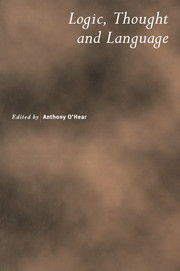Book contents
- Frontmatter
- Contents
- Preface
- Notes on Contributors
- What logic should we think with?
- Mental Representation and Mental Presentation
- Self-knowledge, Normativity, and Construction
- The Normativity of Meaning
- Two Theories of Names
- Relativism and Classical Logic
- Principles for Possibilia
- What are these Familiar Words Doing Here?
- Particular Thoughts & Singular Thought
- Conditional Belief and the Ramsey Test
- Necessary Existents
- Ambiguity and Belief
- Basic Logical Knowledge
- Frege's Target
- Index
Relativism and Classical Logic
Published online by Cambridge University Press: 05 October 2010
- Frontmatter
- Contents
- Preface
- Notes on Contributors
- What logic should we think with?
- Mental Representation and Mental Presentation
- Self-knowledge, Normativity, and Construction
- The Normativity of Meaning
- Two Theories of Names
- Relativism and Classical Logic
- Principles for Possibilia
- What are these Familiar Words Doing Here?
- Particular Thoughts & Singular Thought
- Conditional Belief and the Ramsey Test
- Necessary Existents
- Ambiguity and Belief
- Basic Logical Knowledge
- Frege's Target
- Index
Summary
Let me begin with a reminder of the crude but intuitive distinction from which the relativistic impulse springs. Any of the following claims would be likely to find both supporters and dissenters:
That snails are delicious
That cockroaches are disgusting
That marital infidelity is alright provided nobody gets hurt
That a Pacific sunset trumps any Impressionist canvas
and perhaps
That Philosophy is pointless if it is not widely intelligible
That the belief that there is life elsewhere in the universe is Justified
That death is nothing to fear
Disputes about such claims may or may not involve quite strongly held convictions and attitudes. Sometimes they may be tractable disputes: there may be some other matter about which one of the disputing parties is mistaken or ignorant, where such a mistake or ignorance can perhaps be easily remedied, with the result of a change of heart about the original claim; or there may be a type of experience of which one of the disputing parties is innocent, and such that the effect of initiation into that experience is, once again, a change of view. But there seems no reason why that should have to be the way of it. The dispute might persist even though there seemed to be nothing else relevant to it about which either party was ignorant or mistaken, nor any range of relevant experience which either was missing. The details of how that might happen vary with the examples.
- Type
- Chapter
- Information
- Logic, Thought and Language , pp. 95 - 118Publisher: Cambridge University PressPrint publication year: 2002
- 15
- Cited by

